

Objective journalism - exists and growing. When I started as a journalist, I always went directly to the source, or at least what I thought were the sources.

These days, copying and pasting is a bigger part of journalism. Just this weekend, a NYTimes article, gave pointers to journalists who couldn't copy and paste. The article asked: "How can they [reporters] do their jobs if they can't copy and paste stuff from the Internet? " Goodness. The NYTimes says reporters can't be reporters without copying?
Who Betrayed Objective Journalism? The mainstream U.S. news media often laments the decline of objective journalism, pointing disapprovingly at the more subjective news that comes from the Internet or from ideological programming whether Fox News on the Right or some MSNBC hosts on the Left.
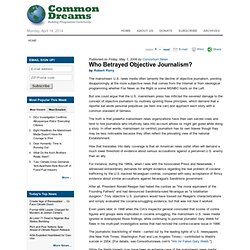
But one could argue that the U.S. mainstream press has inflicted the severest damage to the concept of objective journalism by routinely ignoring those principles, which demand that a reporter set aside personal prejudices (as best one can) and approach each story with a common standard of fairness. The truth is that powerful mainstream news organizations have their own sacred cows and tend to hire journalists who intuitively take into account whose ox might get gored while doing a story.
Rethinking Objective Journalism. July 8, 2003 | Like this article?
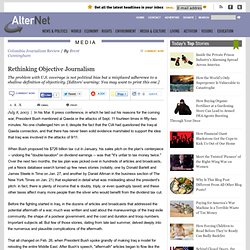
Join our email list: Stay up to date with the latest headlines via email. In his Mar. 6 press conference, in which he laid out his reasons for the coming war, President Bush mentioned al Qaeda or the attacks of Sept. 11 fourteen times in fifty-two minutes. No one challenged him on it, despite the fact that the CIA had questioned the Iraq-al Qaeda connection, and that there has never been solid evidence marshaled to support the idea that Iraq was involved in the attacks of 9/11. When Bush proposed his $726 billion tax cut in January, his sales pitch on the plan's centerpiece -- undoing the "double-taxation" on dividend earnings -- was that "It's unfair to tax money twice.
" Mental Blabberings. Flash back to 1998, I was a junior in high school in the Philippines.
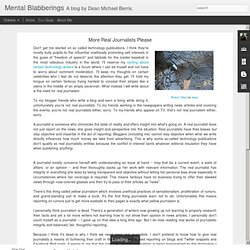
I would have been at the equivalent of 9th grade in the US educational system at age 15. At this point in my life I had been given one of the best opportunities to experience a whole new culture and lifestyle. I had a chance to be an exchange student in middle America for one full year. This post is about how passing up this opportunity changed my life more than I would have ever known at the time. Note: This is Part 2 of a series about my early choices in life which have gotten me to where I am today. Objectivity in Journalism: Is it Even Possible? Dave Barry once said, “We journalists make it a point to know very little about an extremely wide variety of topics; this is how we stay objective.”
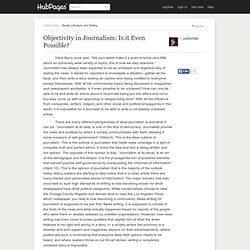
Journalism has always been expected to be an unbiased and objective way of stating the news. It allows for reporters to investigate a situation, gather all the facts, and then write a story lacking an opinion and being credited to everyone except themselves. Should journalists convey emotion when covering crisis events? Objectivity (journalism) Journalistic objectivity is a significant principle of journalistic professionalism.
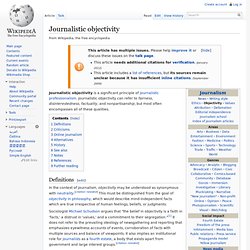
Journalistic objectivity can refer to fairness, disinterestedness, factuality, and nonpartisanship, but most often encompasses all of these qualities. Definitions[edit] The Handbook of Global Communication ... - Robert S. Fortner, P. Mark Fackler. Chapter 57: Fairness. In this chapter, we discuss the reasons for fairness in reporting.
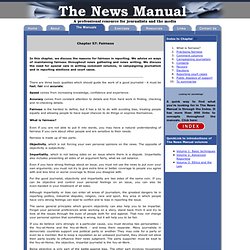
We advise on ways of maintaining fairness throughout news gathering and news writing. We discuss the need for special care in writing comment columns, in campaigning journalism and in reporting elections and court cases. There are three basic qualities which should guide the work of a good journalist - it must be fast, fair and accurate: Speed comes from increasing knowledge, confidence and experience. Accuracy comes from constant attention to details and from hard work in finding, checking and re-checking details. Fairness is the hardest to define, but it has a lot to do with avoiding bias, treating people equally and allowing people to have equal chances to do things or express themselves. What is fairness? Even if you are not able to put it into words, you may have a natural understanding of fairness if you care about other people and are sensitive to their needs.
Principles of Journalism. The first three years of the Project’s work involved listening and talking with journalists and others around the country about what defines the work.

What emerged out of those conversations are the following nine core principles of journalism: 1. Journalism’s first obligation is to the truth Democracy depends on citizens having reliable, accurate facts put in a meaningful context. Public Journalism and the Problem of Objectivity. Objectivity and Fairness - Objectivity and fairness in news stories. You hear it all the time – reporters should be objective and fair.
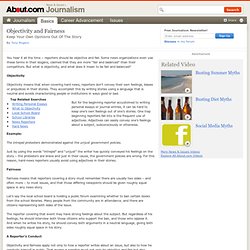
Some news organizations even use these terms in their slogans, claimed that they are more “fair and balanced” than their competitors.